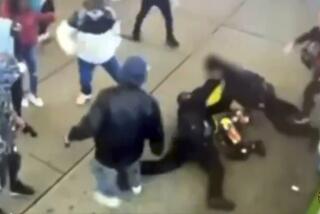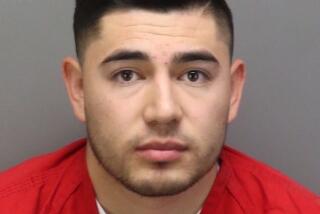ANOTHER SUSPECT IN TV DRUG BUST EXONERATED
San Jose police determined that a man arrested there last week during the live Geraldo Rivera “American Vice” television broadcast was innocent of drug charges and released him less than two hours later--before the program even aired in the Pacific time zone.
As a result of a public outcry in the Northern California city following the controversial broadcast of the mistaken arrest, the San Jose Police Department is reviewing its policy of allowing the news media to accompany officers on drug raids, officials there said Thursday.
A spokesman for Chicago-based Tribune Entertainment Co., which syndicated “American Vice: The Doping of a Nation” to an ad-hoc network of 163 stations across the country, defended the program Thursday and said the media company had no obligation to inform viewers that Manuel Chavez, 23, was not involved in an alleged drug-selling operation broken up at a San Jose house during the Dec. 2 broadcast.
“That’s what the newspapers are doing,” said Tribune spokesman Jack Devlin. “We’re not planning a follow-up broadcast. We were merely reporting the news as it happened.”
On the air, Chavez--described later by San Jose police as an illegal Mexican alien residing in Long Beach--was shown answering the door of the house when he heard officers knocking and shouting.
“We are told that there are three illegal aliens who are dealing, according to the undercover informant, black-tar heroin,” Rivera said on the air from his New York studio as police prepared to raid the house.
With a camera recording the scene and broadcasting it live to the Eastern and Central time zones, officers knocked Chavez to the floor and handcuffed him. Later he was shown handcuffed as police held him outside the house.
(An off-camera arrest did result from the raid. Adauto Lopez Urea, 20, was arraigned Wednesday on charges of possession and possession with intent to sell three grams of black-tar heroin and two grams of cocaine. He is in jail in lieu of $100,000 bail.)
Two hours after Chavez was on the program, at about 7:40 p.m. PST or 10:40 EST, police had determined that he was only a visitor in the house and released him.
Twenty minutes later, at 8 p.m., the two-hour program went on the air in the West, including KTLA Channel 5 in Los Angeles.
Chavez is the second person arrested during the program to have been released. A similar segment shot that night in Houston showed a house painter being arrested. She was later released by a judge who said the police had no probable cause to believe that she was a drug dealer.
Lawyers representing other persons arrested in the Miami area during the program have said that they are contemplating legal action against Rivera and others responsible for the broadcast.
“The arrests, when they were issued, followed all the proper lines in terms of legality, search warrants, etc., and the people were arrested and taken off to jail,” said Tribune Entertainment’s Devlin.
“As far as our part on the show and the law enforcement agencies involved,” he said, “they did everything according to the letter of the law. There was just cause for the searches and the arrests.”
Chavez had an “alibi that we couldn’t crack,” said San Jose police spokesman Sgt. Dwight Messimer, adding that the department is “getting hit over the head” by the TV-drug bust episode.
“We don’t understand why people are making a big thing about it, why the press is making so much of this,” Messimer said.
The program, which aired a second time in Los Angeles over the weekend, has been widely criticized by journalists for its use of the live broadcasts of the drug raids.
News media are often invited to accompany law-enforcement officers on raids. But busts usually are taped for later airing, giving journalists time to edit taped footage and to check the facts of a story before it is broadcast.
Live coverage allows no time for reporters to follow up on the events or to correct errors and mistaken impressions.
San Jose City Manager Gerald Newfarmer asked Wednesday for a report on why the police there cooperated with Rivera to broadcast a live drug bust. Police officials later said they would be reviewing their policy.
“Being told to review your policy,” said the department’s Messimer, “is bureaucratese for ‘change your policy.’ ”
More to Read
Sign up for Essential California
The most important California stories and recommendations in your inbox every morning.
You may occasionally receive promotional content from the Los Angeles Times.









